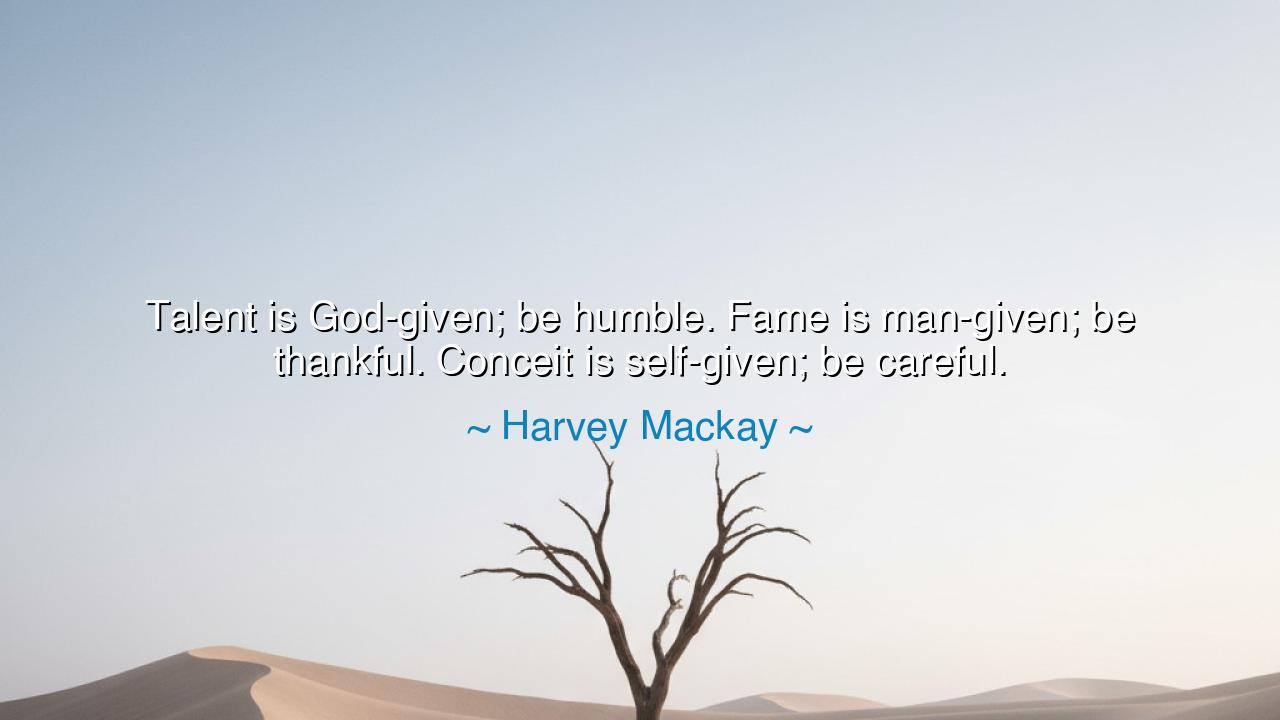
Talent is God-given; be humble. Fame is man-given; be thankful.
Talent is God-given; be humble. Fame is man-given; be thankful. Conceit is self-given; be careful.






Hear the words of Harvey Mackay, a man of keen observation, who set forth this wisdom: “Talent is God-given; be humble. Fame is man-given; be thankful. Conceit is self-given; be careful.” This threefold saying is like a braided cord of truth, binding together the eternal teachings of humility, gratitude, and caution. It is both a warning and a guide for those who walk the perilous road of success, for though gifts are great and recognition is sweet, pride ever lurks like a thief in the shadows.
The first jewel in his words is the truth that talent is God-given. No man fashions his own genius. The strength of the warrior’s arm, the voice of the singer, the mind of the philosopher—these are gifts breathed into the soul by a source greater than themselves. To be humble is to remember that what you hold is entrusted to you, not created by you. The ancients knew this, for the Greeks spoke of the muse who inspired the poet, and the Hebrews spoke of the Spirit who gifted wisdom to kings. Talent is not a crown of pride but a sacred trust.
The second flame is his reminder that fame is man-given. Recognition, applause, the raising of one’s name before the multitude—these are not divine decrees, but the offerings of men. They can be given, and they can be taken away. Therefore, one must not cling to fame with arrogance, but meet it with thankfulness. The applause of others is not owed, but freely bestowed. To be thankful is to honor those who lift you up, to recognize that without their support, your talent would remain hidden in silence.
The third truth, and the most perilous, is that conceit is self-given. Pride is not bestowed by God, nor granted by men—it is the poison we pour into our own hearts. Conceit blinds the eyes, hardens the spirit, and isolates the soul. It whispers that the gift is self-made, that the fame is deserved, that one is greater than all others. And so Mackay warns: be careful. For many have been destroyed not by enemies, nor by lack, but by their own swollen pride.
History bears witness to these truths. Consider the fall of Napoleon Bonaparte. Gifted with military genius, he rose from obscurity to become the master of Europe. His talent was undeniable, and his fame spread across nations. Yet conceit—his self-given belief in his invincibility—drove him to overreach, to wage wars beyond reason, and to meet ruin at Waterloo. Had he remained humble and thankful, his story might have ended in triumph, but conceit wrote his downfall.
Yet there are also examples of wisdom. Consider Mother Teresa, who possessed no fame at first, and only modest gifts by worldly standards. Yet she used her God-given compassion with humility, received recognition from the world with gratitude, and guarded her heart from conceit. Because of this, her legacy endures not in conquest but in compassion, not in pride but in service. Her life embodies the balance Mackay describes.
The lesson for us is clear: be humble, be thankful, be careful. Remember that your gifts are not of your own making—use them with reverence. Accept recognition with gratitude, not entitlement. And guard your heart against conceit, for pride is the seed of ruin. These three principles, if followed, will anchor the soul through both triumph and trial.
Practically, one may live this teaching by daily acts of humility—acknowledging the source of one’s gifts, whether divine or through the help of others. One may practice gratitude by thanking those who support, uplift, or encourage. And one may protect against conceit by seeking counsel, by reflecting on one’s flaws, and by remembering that all crowns of fame will one day turn to dust. In this way, the soul walks safely, firmly, and nobly upon the path of life.
Thus, Harvey Mackay’s words echo like the voice of the ancients: talent is sacred, fame is fragile, pride is dangerous. To honor these truths is to live wisely, to endure beyond applause, and to build a legacy not of arrogance but of virtue.






AAdministratorAdministrator
Welcome, honored guests. Please leave a comment, we will respond soon